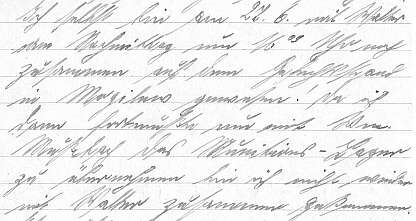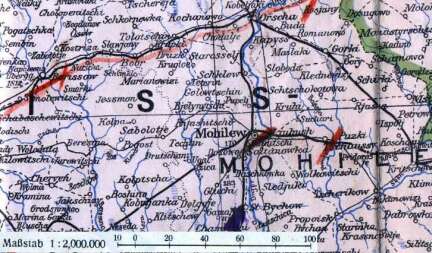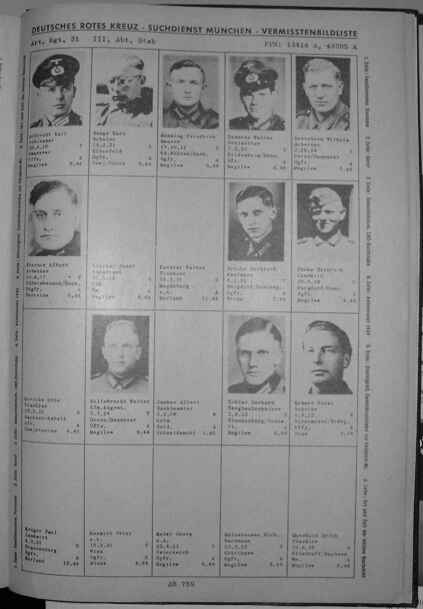|
Home
 Wanted: Information
about the missing Wanted: Information
about the missing
German NCO Walter Hillebrecht
Stab III.
Abt., Artillerie-Regiment 31, 31. Infanterie-Division, last Field Post
Office Number 13414 A
My father,
Walter HILLEBRECHT, went missing in action on the 27th June, 1944 as a
German soldier in Mogilev (Магілёў
Mahiljou, Могилёв Mogiljow,
MahilŽu, Mogilew) Belarus during the battle of Army
Group Center on the eastern front - only a few days before his 30th
birthday. He was born on 7th July, 1914 in Grone / Göttingen. He was
married and had two sons.
Here you can read more
about the man Walter Hillebrecht.
Walter
Hillebrecht was NCO in the "Stab, III. Abt.
Artillerie-Regiment 31, 31. Infanterie-Division". It is assumed that he died
during the fighting in Mogilev, Belarus on 27th June, 1944 or in the
following days. His last Field Post Number was 13414 A. From summer
1943 until March 1944 his Field Post Number was 17787 A, which makes
it likely that he was assigned to the "II. Abt" of the same
Artillerie Regiment 31, to which this Field Post Number was assigned.
A comrade of my
father, NCO Ernst Randhan, on 1st August, 1944 wrote to my mother in
answer to her enquiry, that on 27th June, 1944, at 1600 h, he had been
together with Walter Hillebrecht at the command post in Mogilev. Here
is an excerpt from his letter:
 "Ich
selbst bin am 27.6. mit Walter am Nachmittag um 16.00 Uhr noch
zusammen auf dem Gefechtsstand in Mogilew gewesen. Da ich dann
fortmusste, um mit Wm. (Wachtmeister) Mussbach das Munitions-Lager zu
übernehmen, bin ich nicht wieder mit Walter zusammen gekommen." "Ich
selbst bin am 27.6. mit Walter am Nachmittag um 16.00 Uhr noch
zusammen auf dem Gefechtsstand in Mogilew gewesen. Da ich dann
fortmusste, um mit Wm. (Wachtmeister) Mussbach das Munitions-Lager zu
übernehmen, bin ich nicht wieder mit Walter zusammen gekommen."
"I definitely was
together with Walter at the command post in Mogilev in the afternoon
of the 27th June at 1600h. As I then had to leave to take command of
the munitions depot together with Staff Sergeant Mussbach , I never
met him again."

This is part of a of a map of the western part of the former Soviet
Union that my mother marked with notations to keep track of the
whereabouts of her husband Walter. The last two notations mark Mogilev
(Mohilew) and Tschaussy, about 40 km east of Mogilev.
Until Thursday 22nd June, 1944 the Infanterie-Division 31 had
been positioned in a front line about 40 km southeast of Mogilew. On
this day, the third anniversary of the start of the attack on the
Soviet Union, Soviet forces began a powerful operation under the name
"Bagration". On 24th June, 1944 Soviet troops achieved a
wide breakthrough in the front line north of the division's sector and
carried it deeply behind German lines. My father's division then had
to retreat in westerly direction under constant fighting to avoid
being encircled. This retreat could only be done via the bridges
across the Dnjepr River leading into Mogilev.
The German High Command had declared Mogilev a "Fortified
City", which was not to be given up. After crossing the Dnjepr
River the larger portion of Infanterie-Division 31 passed the city on
the south side in westerly direction in order to reach the Beresina
River at the city of Beresino. The unit to which my father belonged, III.
Abt of Artillerie-Regiment 31, the Grenadier-Regiment 82, and other
parts of the Division were placed under the command of the Commanding
Officer of the "Fortified City" and therefore were separated from
the main part of the Division.
In the morning hours of 27th June the bridges across the Dnjepr
River had been blown up to prevent Soviet forces from reaching the
western river bank. Nevertheless, Mogilev was already surrounded on
the western side by Soviet forces that had crossed the river north and
south of the city on bridges constructed by Soviet army engineers.
Mogilev was taken in the course of the 27th June, 1944 and returned to
Soviet control. Fighting lasted till the early morning hours of 28th
June, 1944. Many German soldiers fell in the fierce fighting.
Remaining survivors were taken prisoners. Only very few German
soldiers were able to break out of the besieged town. But most of them
never reached the retreating German lines either.
There are no reports witnessing that Walter Hillebrecht was killed
in action or wounded. He never reached German lines. Nobody saw him in
a Soviet Prisoner of War camp. It must be assumed that he died in the
battle in or around Mogilev since 1600 h on Tuesday 27th June, 1944 or
was taken prisoner and died before an orderly registration and
documentation of prisoners took place.
If any reader of these lines knows more details I kindly ask him or
her for an email. An
exchange of information is most welcome.
 This
is page 759 of the Missing Persons Register, Vol. AB, of the German
Red Cross ( Suchdienst des Deutschen Roten Kreuzes). This
is page 759 of the Missing Persons Register, Vol. AB, of the German
Red Cross ( Suchdienst des Deutschen Roten Kreuzes).
Click on the picture
to enlarge it. Further clicking will return you here.
Below the pictures are
the following data:
Name, first name
Civilian profession
Date of birth
Rank
Missing: place, month,
year
The bottom line of
each entry shows that many of the missing soldiers went missing in
action since June 1944 in Mogilev. They read,
"Mogilew 6.44"
The missing persons are listed in the
order of military units. Further pages about my father's unit are in
my possession. I gladly share information.
My father is pictured in the third row
from top, second from left. The Staff Sergeant Mussbach, mentioned in
above letter, is the last entry on this page (bottom right, without
photo) and also went missing.
|